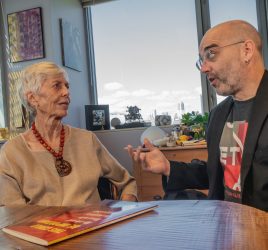“What’s Next?”
Lately I’ve been asking myself a simple question: “What’s next?”
I go through these moments of self reflection as I near the end of a large project. In this case, I’m in the final stages of rewriting Dungeons & Dreamers after several years of on-again/off-again work with my friend and co-author John Borland. The book is now with the copy editor, marketing plans are underway, and we’re just waiting for the last screws to be tightened.
Certainly my time has already been taken up with other activities: So Far Appalachia is underway, my teaching at Ball State continues, and a semi-secret project at the university continues.
But those are projects I’m doing. They aren’t the answer to “What’s next?”
As I’ve reflected on that question, I’ve skimmed an article penned by my former boss.Writing in MIT’s Technology Review, editor Jason Pontin argued “Why We Can’t Solve Problems” in today’s technological world. The premise: We once tried to land on the moon; we now try to make the best software app. We have stopped trying to solve big problems because they are hard.
He talked about this dilemma at the TED conference:
For the past few years, I’ve been aimlessly searching for the Big Problem that I want to work on. As it stands, I’m starting to get the sense of what the problem is. It’s been percolating in my head for a few years, but I’ve not moved forward on it in any meaningful way.
Recently, though, I’ve started discussing the idea with friends, confidants, and mentors. I haven’t worked out the specific details, but the outcome is meant to help us consider and dream a little more. It’s meant to help people blend creativity and wonder. It’s meant to blend science and literature. It’s a Renaissance Project built around the making of things, and the communities that spring up around that.
As I near the end of my 9th year as a college professor, I can’t help but think some of this has been instigated by how I’ve heard others discuss their creative process. Larry Lessig, the man behind the Creative Commons and Rootstrikers, said he spends about 10 years on an intellectual pursuit before starting over. Comedian Louis C.K. throws out all his old material each year, like George Carlin, so that he’s forced to begin anew regularly.
This makes a great deal of sense to me. The idea is to propel yourself forward, and to avoid the quicksand of time. The idea is to remind yourself that there are Big Problems, and that the only way you solve them is to continually move forward.
The idea is to figure out the answer to “What’s next?” After a few years of wandering, my answer is starting to come into focus.




One comment